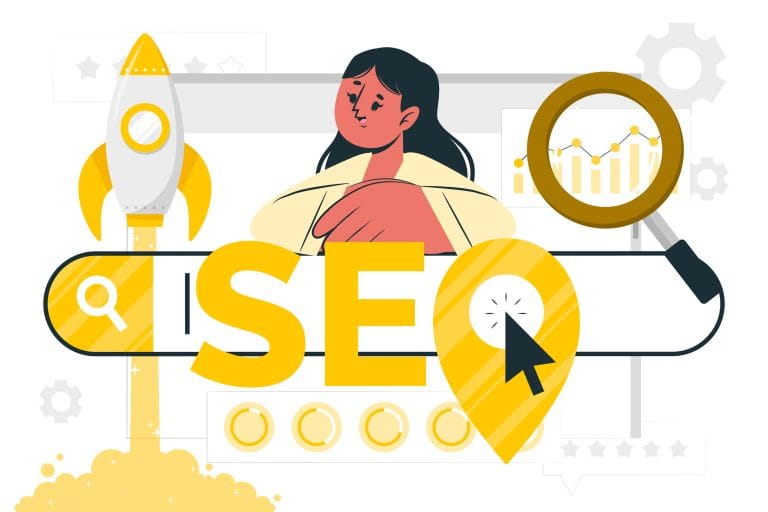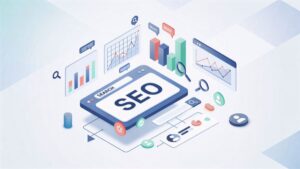Introduction
Artificial intelligence is leaving no sector untouched; similarly, in the domain of digital marketing, it is playing a significant role. When artificial intelligence is incorporated into search engine optimization methods, it introduces a shift in the optimization process for any business to have better search rankings and a presence online. This article highlights how AI might support SEO with actionable insights and tips.
What is artificial intelligence?
Artificial intelligence, or AI for short, is nothing more than the reproduction of human intelligence in machines pre-programmed to think and learn. Artificial intelligence refers to a number of technologies, from machine learning and natural language processing to neural networks themselves, which allow the computer to perform some job categories connected to human intelligence. These range from speech recognition, natural language understanding, decision-making, to even very complex problem-solving.
AI has broadly been categorized into narrow AI, which is designed to deal with specific tasks, and then general AI, which can understand and learn whatever task is intellectually executable by a human being. In the case of SEO, the narrow AI is that which is highly used because it is brilliant at analyzing the data and finding out the patterns to then make very well-informed decisions based upon those patterns.
Artificial intelligence’s role in search engine optimization
AI is definitely here to aid modern SEO by automating tasks, drilling deeper into statistics, and creating personalized user experiences. Artificial intelligence algorithms scour through massive quantities of data, finding patterns, and making predictions for refining SEO strategies toward better search rankings. Here are a few ways in which AI is changing SEO:
Automation: AI performs all these repetitive tasks, from keyword research to content optimization and performance analysis, so that more time can be available to the SEO professional to wrack one’s brains over strategy.
Insights: AI can provide deeper insights into user behaviors, search trends, and competitive analysis, basing business decisions on data.
Personalization: This facilitates personalization with content recommendations and user experience, which eventually drives engagement and satisfaction.
Predictive Analysis: AI can be used to solve business-related problems that are concerned with predicting the future trend and behavior of your business from historical data, thereby helping your company stay ahead of the competition curve.
Key Benefits of Using AI for SEO
Keyword Research
What it can do is improvise the keyword research features by understanding user intent, search behavior, and the moves by competitors. Tools oriented toward AI could recommend high-performance keywords and long-tail varieties on the use of user search behaviors.
Traditional keyword research tools had to rely on historical data and basic metrics to identify keywords. AI-powered research tools use a machine learning algorithm through which it learns the context and intent behind search queries to generate better keyword suggestions relevant to a user’s intent.
For instance, it can parse all the search queries of the users who land on your site to try to find some patterns in their behavior. Then, it can suggest keywords likely to attract similar users. This level of precision helps you target the right audience and improve search rankings.
Content Creation and Optimization
AI-powered tools can be used to generate ideas for topics, optimize content that already exists, and even help in drafting articles. It always does a comparative analysis of the dominating content in the industry, bridges any gap that is identified, and further gives a tip-off on how one can improve his or her performance in SEO. Other applications of AI may be the optimization of meta tags, headlines, or keyword density.
Content creation is time-consuming but made easier with AI through data-driven insights and recommendations.
For example, it can analyze what’s on the top pages for a target keyword and come up with suggestions in terms of how to improve the content so that it either matches or excels in quality.
It can also help in the optimization of on-page elements, from meta descriptions to title tags and header elements. Based on this content and structural analysis of top-ranking pages, AI will recommend optimized versions of these elements for better search visibility.
AI will ensure that this content is personalized for users depending on their behavior and preferences for improving the user experience. This includes better user experiences, higher on-site time, reduced bounces, and high engagements directly proportional to better SEO rankings.
User engagement is one of the major factors for search engine optimization. Search engines like Google view its metrics, such as time on site, bounce rate, and click-through rate, before determining search ranking. AI can improve all these metrics through betterment in user experience personalization.
For example, AI can analyze user behavior and preferences to recommend relevant content, products, or services. Well, that’s a really personalized approach to creation, with increased satisfaction of the users and the urge to spend more time on the website, hence enhanced SEO performance.
Advanced Analysis of Data
That is more processing than any human could handle and analyze; it is just one of the capabilities of AI. The AI-fueled analytics tool further helps in gaining insight into user behavior, site performance, and SEO effectiveness, which all help lead to data-driven decisions refining the SEO strategies.
On the other hand, the data is vast, sometimes overwhelming. AI makes all this much easier by automating data collection, analysis, and reporting. AI tools can help analyze user behavior by detecting trends and giving actionable insights on the best way to optimize your SEO strategy.
For instance, AI can crawl through all your web pages and identify which ones are poor and which ones are good performers. It can assess user behavior to see what kind of content your targeted audience resonates most with and that which needs revitalization or optimization. This creates a constant renewal and refreshment within your SEO strategy.
Artificial Intelligence SEO Tools
AI Keyword Research Tools
SEMrush—AI-powered, end-to-end keyword research and competitor analysis. Focusing on metrics such as search volume, keyword difficulty, and competitiveness landscape, SEMrush’s AI algorithms throw up the best keywords that need to be targeted in an SEO campaign. It also helps bring out related keywords, search trends, and possible traffic opportunities.
With the use of machine learning, Ahrefs not only provides keyword suggestions but also analyzes the search intent behind them. Its application of AI functionalities in relevance to surrounding context and intention is how Ahrefs churns out even more numerous keyword suggestions and competitive analysis. Advanced features include keyword difficulty scoring, SERP analysis, and keyword ranking tracking.
AI Content Optimization Tools
Clearscope increases content relevance and comprehensiveness using artificial intelligence. The AI algorithms of Clearscope show—in reference to top-performing content for given keywords—how a user can make improvements in their content to match or better the quality of such top pieces. This includes relevant topics, keywords, and content structure that would improve SEO performance.
MarketMuse: It assesses top-ranking content to identify information about the best recommendations to enhance the overall quality of the content. This is where the advanced AI content analysis tools of the company come in—to audit your existing content, outline topics, keywords, and the structure of the content to make sure it is comprehensive, relevant, and search engine-friendly. AI Analytics and Reporting Tools
Google Analytics with AI basically means providing users with behavior and site performance insights driven by machine learning algorithms. So, under Google Analytics AI, users receive advanced insights into user behavior, traffic patterns, and site performance. This can be done with predictive analytics, anomaly detection, and automated insights, helping to optimize SEO strategies.
IBM Watson: It features advanced analytics and data visualization to keep up with the performance of SEO. Driven by AI, tools on this platform give an even finer look into what users are doing while on your site, the performance of the site, and how effective it is. It also included predictive analytics via data visualization with automated reporting, so you can move forward with data-driven decisions.
Integrating AI into Your SEO Strategy
Step-by-Step Guide
Set up goals: The goals for SEO using AI need to be firmly established, such as increasing organic traffic, improving search rankings, or engaging with users. All that sets specific, clear targets that show how successful AI-driven SEO is and how it can be improved further.
Choose AI tools. Select only those that turn out to be of the best help in the achievement of goals within the set budget. Determine several AI tools that you can compare to determine what would help solve your need. In making your decisions, look at things such as ease of use, features, and cost.
Keywords Research: Let AI do the work and make out the best keywords to draw your content plan. Now, on keyword research, AI-driven tools are best at explaining the trends of search, user intent, and competitive analysis that define the best keywords for an SEO strategy.
Content Optimization: AI will help you optimize existing content and create new, SEO-friendly content. This class of AI-based tools will, through machine learning, parse existing content, make recommendations on how to improve it, and then support the actual creation of new, relevant, comprehensive, and search engine-optimized content.
Monitor and analyze: Maintain continuous monitoring of performance with AI analytics and modify strategies based on insights. Conventional AI-driven analytics tools can deliver updates. instantly based on the users’ behavior, performance of the site, or even effects of SEO strategies. Use these insights to drive data-driven decisions in optimizing your SEO strategy.
Refine Strategy: Audit and continuously refine the SEO strategy through AI-driven data and trends. By definition, SEO is an ongoing process. One must keep working to refine the strategy based on fresh data and the latest trends. Use AI tools for that purpose in an ongoing manner to always be ahead.
For instance, a leading e-commerce site enhanced its level of organic traffic by 50% through artificially intelligent keyword research alongside content optimization. This e-commerce site can utilize artificially intelligent-driven tools to find out what the high-performance keywords are, optimize product descriptions, and create contents that speak to the target market. Thus, it made a huge jump regarding organic traffic and rocketed to higher search rankings and higher conversion rates.
Case Study: Technology Blog
A technology blog would make the search ranking better by using AI analytics in detecting and filling in content gaps. For example, a technology blog could increase search ranking and, as a result, help it get new audiences and increase user engagement. This is established with the help of AI analytics tools analyzing users’ behavior to understand what works and what doesn’t. This helps the blog enhance search rankings, get more organic traffic, and increase user engagement through optimization of already existing content and development of new, relevant content.
Challenges and Considerations
As good as AI is concerning SEO, it has some challenges and considerations, such as:
Data privacy: AI consumes vast amounts of data. You need to ensure that collecting and using the data is done in a manner compliant with data privacy.
Cost: AI tools can be very costly, more so to small businesses. This gives you more reason to invest in an AI tool that will bring about great value for your money.
Complexity: AI tools may come very complex and even need some expertise in their usage. Invest some training and support to get the best out of your AI tools.
Ethics: This comes very importantly, more so when it involves the generation of content with the use of AI. Make sure, however, when generating AI content, it is truthful, appropriate, and maintains user privacy.
Future Trends of AI in SEO
From voice search to predictive analytics to automated generation of content, AI is on the verge of disrupting SEO even further. Here are some future trends to watch for:
Voice Search Optimization: As voice search grows rapidly, so will the need to optimize it. AI, in this case, can come in by taking in the data from voice search and giving insights into how one can optimize their content for voice search.
Predictive Analytics: AI-driven predictive analytics provide data insights from possible future tendencies and behaviors, thus keeping business on top of that learning curve. This may also include predictions for changes in search trends, behavioral change by users, or even changes in the competitive landscapes.
Automated Content Generation: AI is growing more and more advanced in high-quality content creation. Before long, it will not take human interjection for AI to write a complete article, blog post, and even video content. This extends more thinking time to the SEO professionals for strategy and analysis.
Conclusion
Artificial intelligence in search engine optimization strategies opens up avenues for benefits ranging from enhanced keyword research to facilitating a better user experience. AI tools and technology can, therefore, be effectively used by businesses scaling up their efforts in SEO to translate into better rankings and driving more organic traffic back to the website.




